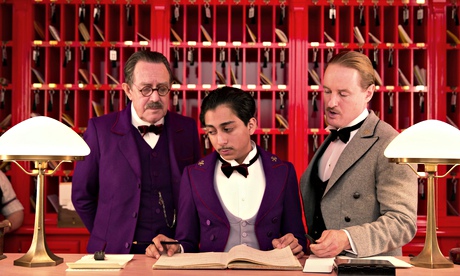
Whatever the patchiness of the rest of its lineup, the Berlin film festival tends to start off with a bang, and this year is no exception: the world premiere of the new film from Wes Anderson, that master of archly sculpted dialogue and meticulous, retrofitted design. The arrival of The Grand Budapest Hotel is particularly appropriate, for this is the moment in the Anderson oeuvre when he turns to consider all things Mitteleuropäische – refracted, as a closing credit tells us, through the work of the prolific Austrian writer Stefan Zweig.
Zweig specialised in novellas – Letter from an Unknown Woman, Fear, The Royal Game – normally designed to illuminate some plangent melodrama in interwar Vienna. Without being a direct adaptation of anything specific, The Grand Budapest Hotel distils many of the story's elements. Anderson has concocted what is essentially a Ruritanian picaresque, stuffed full of bizarre character studies, and fashioned with his, by now familiar, handcrafted attention to detail. In fact, like much of Anderson's work, you get the feeling many of the scenes have been lifted directly from a sketchbook; certain sequences here are animated with little discernible effect on the general sensibility.
The central figure in the film is one Gustave H (Ralph Fiennes, on mercurial form), the concierge of the eponymous hotel, which is located not in Ruritania but an equally fictitious principality called Zubrowka. Gustave's activities are relayed to us via the very Zweig-esque device of an itinerant novelist (Jude Law) encountering the hotel's mysterious owner, one Zero Moustafa (F Murray Abraham, playing the rich, sonorous tones card for all it's worth), who unburdens himself of his childhood stint as a lobby boy back in the 1930s.
As seen through the eyes of Moustafa's younger self (played by Tony Revolori), Gustave's mastery of the concierge arts includes regularly seducing the desiccated female aristocrats who throng the hotel in its golden age. One of these, played with customary searchlight-through-fog brilliance by Tilda Swinton, leaves Gustave a valuable painting in her will; her scowling, posturing family, headed by Adrien Brody (who, it must be said, looks born to wear a hussar's uniform), will stop at nothing to deprive Gustave of his inheritance.
In some hands, this convoluted, labyrinthine narrative would end up a sprawling mess, but such is Anderson's storytelling discipline – informed and sustained by the precision of the cinematography and set design – that it never gets away from him. As Gustave skips from hotel lobby to prison camp, from railway carriage to drawing room, the architecture of this picaresque remains entirely lucid. It helps, a little, that Anderson's clout has secured an instantly memorable A-list face for virtually every role, however small: Bill Murray, Willem Dafoe, Edward Norton, Saiorse Ronan, Jeff Goldblum, Harvey Keitel, Matthew Amalric … the list goes on.
With this film, Anderson has built a thoroughly likable vision of a prewar Europe – no more real, perhaps, than the kind of Viennese light-operetta that sustained much of 1930s Hollywood – but a distinctive, attractive proposition all the same. It's a nimblefooted, witty piece, but one also imbued with a premonitory sadness at the coming conflagration; the scenes where Gustave and Zero are threatened by jackbooted thugs are properly alarming. In this, the film reflects Zweig's own miserable death in 1942: a suicide pact in Brazil with his wife, exiled like so many Austrian Jews, his dreams of European unity shattered. Anderson's film is not a memorial to him, exactly; but it summons up, rather wonderfully, the spirit Zweig represents.
• This article was amended on 7 February 2014 to correct the spelling of Jeff Goldblum's name.

